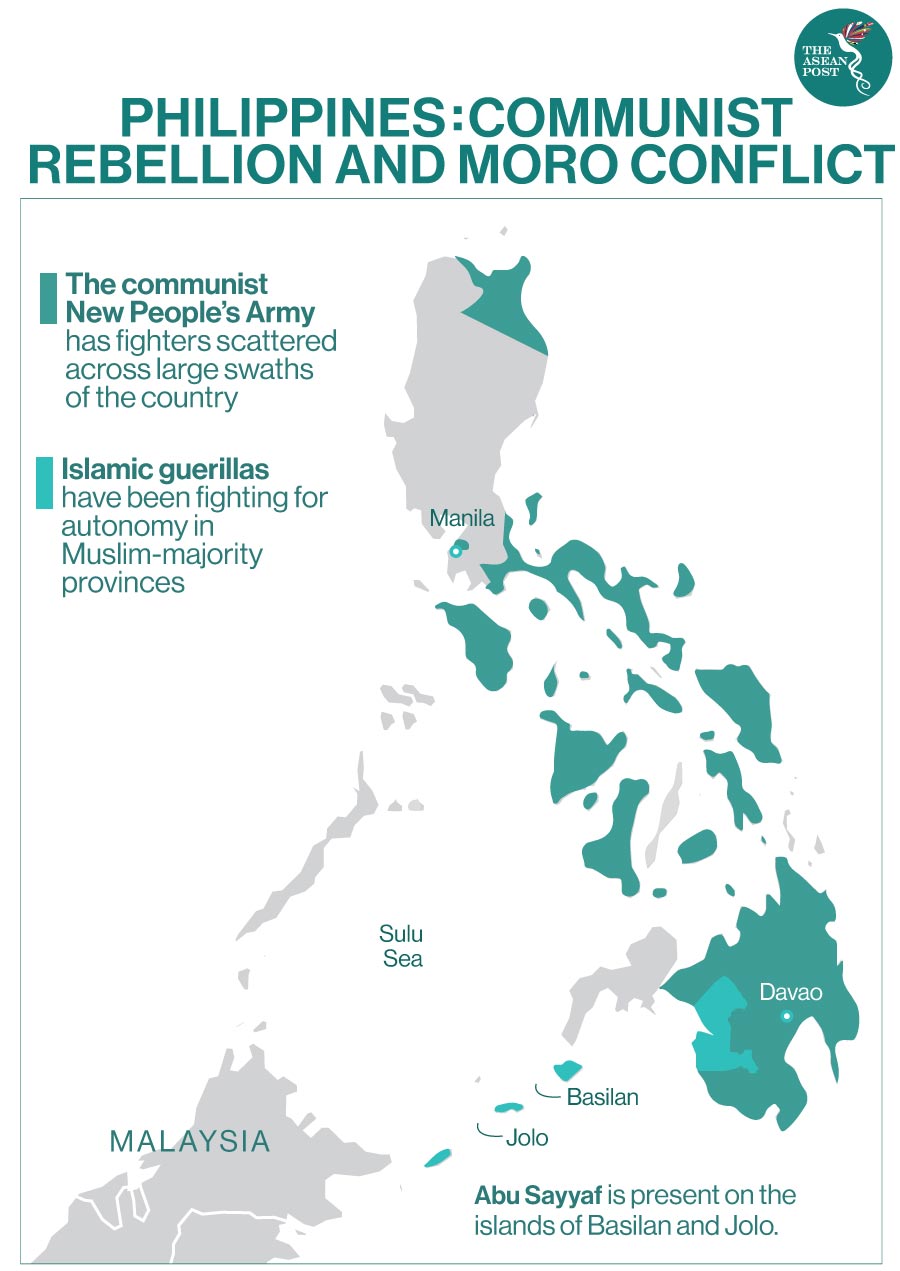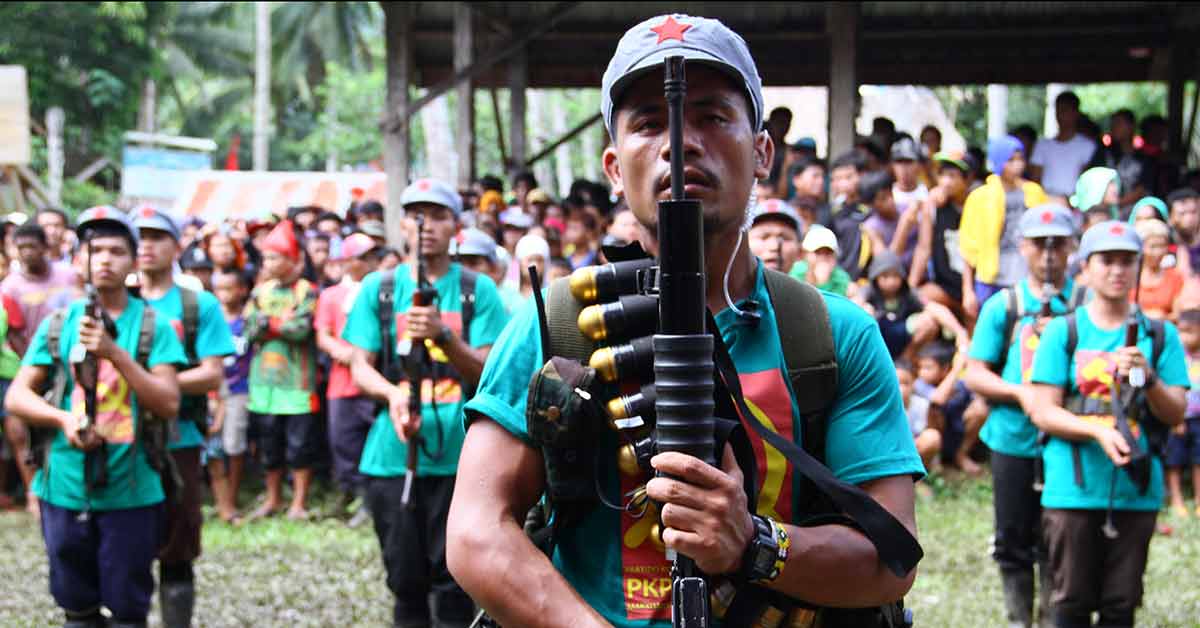War is hell, no doubt about it. In whatever sense, armed conflict always generates misery, despair, and torment in the affected communities. It causes death and destruction and kills innocent civilians not just combatants.
The Philippines, like some other countries in Asia and the Pacific and even beyond has been a site where localised conflicts between non-state armed groups and state forces occur on a regular basis.
One of the localised armed conflicts that the Government of the Philippines (GPH) has been battling with for more than half-a-century (52 years) is the world’s longest-running “protracted-war” with the Communist Party of the Philippines, National Democratic Front of the Philippines and New People’s Army (CPP-NDF-NPA) since 1968. The NPA is the armed wing of the CPP while the NDF is the political arm of the CPP.
The CPP-NPA launched their armed struggle against the Philippine government in 1968 intending to overthrow the Marcos regime and has since then waged a continuing but fragmentary battle to overthrow the Philippine government, launching intermittent attacks against state forces and establishments, while consolidating local power bases.
As an upshot of the 1986 Edsa Revolution that toppled the Marcos regime, leading to the election of Corazon “Cory” Aquino to the presidency, initiatives to embark on a peace negotiation with the CPP-NDF-NPA came into play with a prospect of creating long-lasting peace and harmony in the country.
Peace Talks With NDFP
The pursuit of a just and lasting peace with the CPP-NDF-NPA by the GPH started way back in 1986 during President Corazon (Cory) Aquino’s time. However, the peace negotiations under President Cory’s time were short-lived and it collapsed soon after state security forces opened fire and violently dispersed farmers marching to Malacañang Palace in protest of the lack of government action on land reform.
This tragic incident has been remembered as the “Mendiola Massacre” since it took place in the streets of Mendiola in Manila on 22 January, 1987. Subsequently, Cory declared a “total war” against the communist forces. This resulted in a stalemate.
But then again, the impasse in the peace negotiations between the two sides and the policy of a “total war” against the communist rebels have become the state of affairs of the succeeding administrations up until today apart from the time of President Fidel Ramos.
Under Ramos, peace talks with the NDF, which was reopened in 1992 had gained some traction and led to the signing of several agreements. Nevertheless, it was not conclusive and did not in any way whatsoever shepherd a “peace treaty.”
Ramos’ predecessors, including President Rodrigo Duterte had tried several times to forge a peace deal with the CPP-NDF-NPA; nevertheless, the peace negotiations were not only intermittent and inconclusive but rather ended in deadlock and stalemate.
Under the current administration, President Rodrigo Duterte proclaimed last Monday (7 December, 2020) that he will no longer entertain “peace talks” with the CPP-NDF-NPA and will not declare a ceasefire “ever again” with the communist insurgent group for the rest of his term.
The reason why Duterte terminated peace talks is due to the non-compliance on the part of the CPP-NDF-NPA with the four preconditions set by the GPH.
These four preconditions are (1) no coalition government/no power-sharing that violates the Philippine Constitution; (2) no arson/attacks; (3) no revolutionary tax/extortions; and (4) no recruitment/mass mobilisation.
The non-fulfilment and the continuous violations of these preconditions is viewed by the GPH as a sign of insincerity and unworthiness on the part of the CPP-NPA. Likewise, a plan by the communist bloc to oust President Duterte (launched in May 2017) was discovered by state forces, and is one of the key reasons why peace negotiations were terminated by the Duterte administration.
Since 1986, over 40 rounds of talks have been conducted by GPH panels, which have been disrupted more than 15 times for various reasons but mainly because of issues related to sovereignty, the demand of the NDF to release all or most of its detained CPP-NPA leaders, and the continued refusal of the CPP-NDF on the dissolution of the NPA and its strong resolve that the NPA should retain arms.
After 34 years, of “on-and-off” peace negotiations, it is but obvious that the root of the problem is the unchanging paradigm of the CPP-NDF-NPA. For them, peace talks are part of a strategy in advancing their protracted war against the Philippine government rather than a peace strategy with an ultimate goal of ending the war.
Peace for them is only achieved when their revolution has succeeded. Hence, this just goes to show that the path to forging a peace pact with a communist rebel group is a “thorny and “zig-zag road” that is quite difficult and gruelling to navigate.
Localised Peace Talks With The Reds
Despite the breakdown of peace talks and ceasefire under the Duterte administration, the end of the insurgency remains a determined goal for the GPH. Indeed, there’s no better substitute for a just and lasting peace.
For the GPH, crisscrossing the road to peace is still the way forward and a much better option than armed conflict and war. And this has been the rationale in the GPH’s implementation of the localised peace engagements (LPEs) with the communist rebels at the community level without necessarily violating the Constitution.
Localised peace engagements (LPEs) being put forward by the National Task Force to End Local Communist Armed Conflict (NTF-ELCAC), a multi-agency body created by Executive Order (EO) No. 70 or the “Whole-of-Nation” approach,” is among the priorities of the Duterte administration.
Under the EO, the task force is mandated to provide an efficient mechanism structure for the implementation of a "Whole-of-Nation" approach, which was likewise institutionalised as a government policy for the attainment of inclusive and sustainable peace.
LPEs use non-traditional measures of convincing members of the NPA to give up the armed struggle and return to the fold of the law and be part of mainstream society as peaceful and productive civilians.
The LPE is anchored on the concept of “normalisation”, which include: (i) the transformation of armed fighter to peaceful civilians; (ii) the delivery of socio-economic programs to affected communities; (iii) the provisions of possible amnesty programs; and (iv) the healing process among former rebels and victims of armed conflict.
Hence, the LPE is the manifestation of the GPH’s strong resolve and decisiveness to put an end to the local communist armed conflict that has in 52 years cost not only at least 60,000 lives of civilians, cadres, rebels, and soldiers but has also ruined communities and families across the country; damaging billions of pesos worth of public infrastructure and undermining democratic and community structures in the Philippines. The LPE directly addresses the roots of the armed rebellion involving all national and local government agencies together with key stakeholders including the rebels themselves.
LPEs’ Milestones
With the implementation of the LPE, the Enhanced Comprehensive Local Integration Program (E-CLIP) has been rolled out by the GPH. Through E-CLIP, qualified former NPA rebels and Militia ng Bayan members are being provided with opportunities to be productive members of society.
As of 31 August, 2020, the GPH had provided various forms of assistance to qualified beneficiaries under the E-CLIP. These include: (a) providing 4,767 former rebels with financial benefits amounting to over PHP 353 million (US$7.3 million) from the Department of Interior and Local Government (DILG); (b) around PHP 190 million (US$3.9 million) was allotted by the DILG for the construction of Halfway Houses for 35 provinces and three highly urbanised cities. Halfway houses serve as temporary shelters for the rehabilitation and healing sessions of former rebels going through the process of reintegration; (c) 464 former rebels were covered under the Department of Trade and Industry’s Livelihood Seeding Program; (d) 2,105 former rebels benefited from the Department of Labor and Employment’s Integrated livelihood program and the TUPAD program; (e) 10,079 former rebels including their dependents were provided assistance through the different social protection programs of the Department of Social Welfare and Development; (f) 53 former rebels are now residing in housing units in the Freedom Residences in Tagum City provided by the National Housing Authority; (g) four former rebels were also given cheques for housing assistance by the housing authority; and (h) 3,742 former rebels graduated from the Technical Education and Skills Development Authority Skills Training.

The Inter-Agency Task Force Balik-Loob (TFBL) on the other hand was also created to oversee the GPH’s consolidated efforts to reintegrate and address the needs of former rebels, their families, and communities. The TFBL thus far has recorded around 13,460 former NPA rebels who have surrendered from 1 July, 2016 to 31 August, 2020.
A Lost Cause
Considering that the LPEs have made significant milestones and impact on the peace and security situation of the affected communities in various parts of the country, and the mere fact that hundreds to thousands of CPP-NPA rebels/cadres have returned to the folds of the law and the number is increasing by the day, only suggests that the communist insurgency is turning out to be a lost cause with each passing day.
Also, the results of a survey conducted in March 2017 by the Social Weather Station, where the Filipino public gave poor trust ratings to the CPP-NDF-NPA, with the NDF receiving a negative 10 rating and the CPP/NPA receiving a negative 27 rating, again suggests that indeed the communist insurgency is a lost cause.
Filipinos, in general, want an end to the longest-running insurgency in the world for it is counter-productive to the development and progress of the country, especially in the countryside.
Likewise, the fact that many local government units have already declared the CPP-NPA as persona non grata just goes to show that the communist insurgency is a lost cause and the CPP-NDF-NPA is already losing its battlegrounds.
As of 11 December, the DILG reported that a total of 1,546 local government units (LGUs) across the country have passed resolutions declaring the CPP-NDF-NPA as persona non grata in their respective localities. Of this number, 64 are provinces, 110 are cities, and 1,372 are municipalities, while the remaining 169 LGUs are at the moment in various stages of deliberation in this regard. Around 12,474 barangays (villages) nationwide have also declared the CPP-NPA as persona non grata.
Conclusion
Without a doubt, the approach of the GPH in its quest to end local communist armed conflicts in all regions of the country and to bring peace to the countryside is gaining a substantial and far-reaching foothold and traction.
One huge factor to the relative success of this peace strategy is the cooperation and coordination of all government agencies from the national government to the LGUs, as they work together, with the help and cooperation of the private sector and the Filipino public in general.
Peace cannot be imposed. It has to be worked out by various parties – the government, the armed opposition, the civilian population, and when necessary, the international community with utmost sincerity, trustworthiness, and well-meaning intentions.
Thus, if the crux of the problem of the peace talks between the GPH and the CPP-NDF-NPA is not resolved, then a peace deal with the communist rebels at the NDF level will never be achieved even beyond Duterte’s term.
Related Articles:

